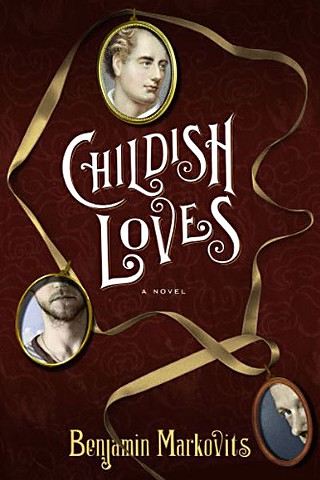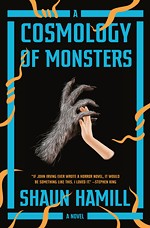Benjamin and Byron's Long-Term Affair
An émigré author, a bad-boy poet, and an epic trilogy at its end
By Roberto Ontiveros, Fri., Sept. 30, 2011
Lord Byron has inspired many a rock star and writer – not to mention an unctuous performance by Gabriel Byrne in that Kenneth Russell classic Gothic, as well as a funky comparison to Elvis Presley by cultural critic Camille Paglia. But for London-based Austin-émigré Benjamin Markovits, the aura of this decadent bard/baron is a deep source of personal literary gratitude.
"Byron was more than just a subject for me," says Markovits, who teaches creative writing at the Royal Holloway, University of London. "He was part of my teenage love of books, and I think a lot of kids go through something important when they start to read seriously for the first time in their lives. Reading teaches you that other people can be as strange and intricate as you seem to yourself."
With the publication of Childish Loves, a bibliophilic meditation in the guise of a historical novel, Markovits has completed an ambitious metafictional trilogy based on the sybaritic exploits of the notorious poet who slept with his half-sister and died of a fever contracted while defending liberty in Greece.
"It's a novel about the love of books and the importance of books to people's ideas of themselves," says its author, regarding his sixth book.
In Imposture, the first of the series (which includes the superb stand-alone A Quiet Adjustment), we are introduced to the mysterious Peter Sullivan, an aging, headphone-wearing high school teacher who has written a stack of Byron books that he bequeaths to a fictional Benjamin Markovits. Childish Loves returns us to the mysteries of the dead writer by way of three stories that, through their focus on the poet, shed light on Sullivan's secret life.
Though the cumulative effect of the trilogy seems absolutely informed by postmodernity, Markovits feels guided by a sense of tradition and an adherence to authenticity: "The Romantics loved playing games with fragments and frames, but for them, it was part of an attempt to make the art seem real. Postmodernism uses the frame to undermine the reality of the picture. I like realism, and one of the things I try to do in Childish Loves is make it seem as real as possible. And that means accounting for who's writing what the reader reads and why.
"I don't like told history in historical fiction, at least in my own. You know, 'London in 1818 was the kind of city ....' I like to write the book as if it were a contemporary novel, just contemporary to a different period," says Markovits, who used to teach high school English and incorporates the pedagogic lifestyle into Childish Loves. "The thought of someone who spends his working career going back year after year to the classic works of literature – Hamlet, Great Expectations, Huck Finn, et cetera – and trying to find new things in them, while every year the kids he teaches change and grow and leave him behind, strikes me as very suggestive."
There is, in Childish Loves, aside from the framed tales of panic and perversity, also a serious criticism of the academic lifestyle.
"A lot of writers teach for the obvious financial reasons, though I think many of them also like getting out of the house. And teaching is basically a flattering occupation: You have smart students who have to listen to what you say. I'm also not one of the writers who thinks the only thing you can do in a creative writing class is give your best students the number of your agent." Markovits thinks there are things, in creative writing, that can be taught, and "it's been interesting to me as a writer to work out what they are. It's also another part of the act of persuasion that makes you want to write books in the first place: to tell people how you see the world."
One of the strangest and most affecting treats in Childish Loves involves the fictional Markovits and his dealings with the Society for the Publication of the Dead, a cabal of grieving literary executors who meet for dinner and try to figure ways to publish the manuscripts of their dead friends and relatives. On the inspiration for this, Markovits says: "I once bought a book in New Orleans called Have Pen, Will Autograph, which was entirely about the weird and mostly awful experiences its author had giving readings and signing books. I've had a few odd experiences myself, which I put together into the Society – it's often the episode I find myself reading at readings."
One gets the feeling that Markovits – who, due to geographic jumps that took him from Texas to playing amateur basketball in Germany and teaching in London, admits to feeling "rootless, and always something of an outsider" – finds his true home in literature.
Aside from weaving intricate novels that extend the genre of historical fiction, this father of two may, like his fictional counterpart, be involved in a little posthumous reputation-saving: "Byron tends to get played on film for camp value. People forget what Disraeli said about him: that the striking thing about Byron was his 'pure, unalloyed sagacity.' He was a shrewd, sensible observer and friend, in spite of his vanities. And that part tends to get left out – I hope to show it in my book."
Benjamin Markovits will read at BookPeople on Friday, Sept. 30, at 7pm.











